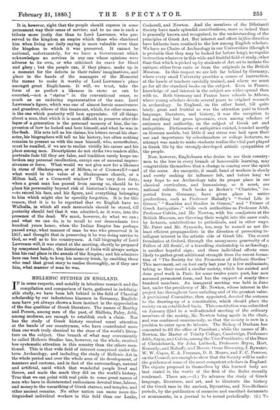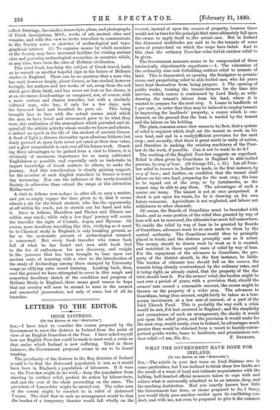HELLENIC STUDrES IN ENGLAND.
IF in some respects, and notably in laborious research and the compilation and comparison of facts, gathered in indefatig- able study, we have been left behind in the field of Classical scholarship by our industrious kinsmen in Germany, English- men have yet always shown a keen instinct in the appreciation of the fine qualities of Greek literature. The names of Bentley and Porson, among men of the past, of Shilleto, Paley, Jebb, among moderns, are enough to establish such a claim. Nor has the study of Greek history received scant attention at the hands of our countrymen, who have contributed more than one work truly classical to the store of the world's litera- ture on the subject. One branch of what may conveniently be called Hellenic Studies has, however, on the whole, received less systematic attention in this country than the others men- tioned. This is that wide field of interest comprised under the term Archmology, and including the study of Hellenic Art in the whole period and over the whole area of its development, of manners and customs, and in fact of the surroundings, natural and artificial, amid which that wonderful people lived and throve, and made the mark they did on the world's history. True that we can point with real pride to some great names of men who have in disinterested enthusiasm devoted time, labour, and moneyto the unearthing of Greek statues, and temples, and other ancient remains. No other nation can name more dis- tinguished individual workers in this field than our Leake,
Cockerell, and. Newton. And the members of the Dilettanti Society have made splendid contributions, more so indeed than is generally known and recognised, to the understanding of the principles of Greek Art. But interest and effort inIthis direction have hitherto been confined to the few among English scholars.
We have no Chairs of Archasology in our Universities (though it is probable that they may be looked for before long), no regular instruction whatever in this wide and fruitful field of study, other than that which is picked up by students of Art set to imitate the antique, either from casts or from the originals in the British Museum. In this respect we are left far behind by Germany, where every small University provides a course of instruction, at the hands of teachers carefully trained, and where we must go for all the standard books on the subject. Even in France, knowledge of anti interest in the subject are wider-spread than with us. Both Germany and France have schools in Athens, where young scholars devote several years to original research in archmology. In England, on the other hand, till quite lately, great and fruitful as was the attention paid to Greek language, literature, and history, it was the exception to find anything but gross ignorance, even among scholars of eminence and authority, on the subject of Greek art and antiquities. Dictionaries of antiquities existed, founded mostly on German models, but little if any stress was laid upon their use and importance by schoolmasters or college lecturers, no attempt was made to make students realise the vital part played in Greek life by the strongly-developed artistic sympathies of the people.
Now, however, Englishmen who desire to see their country- men to the fore in every branch of honourable learning, may congratulate themselves that a change is coming over the spirit of the scene. An energetic, if small, band of workers is slowly anti surely making its influence felt, and before long we may hope to see Archreology take its proper place in our classical curriculum, and humanising, as it must, our national culture. Such books as Becker's " Chmicles," im- ported from Germany, have given place to native productions, such as Professor 1ifahaffy's "Social Life in Greece," "Rambles and Studies in Greece," and "Primer of
Greek Antiquities ;" while such authorities as Professor Jebb, Professor Colvin, and Mr. Newton, with his coadjutors at the
British Museum, are throwing their weight into the same scale, by lectures, contributions to periodicals, and in other ways. Mr. Pater and Mr. Symonds, too, may be named as not the least efficient propagandists in the direction of promoting in- telligent interest in the artistic side of Greek life. The recent foundation at Oxford, through the anonymous generosity of a Fellow of All Souls', of a travelling studentship in archaeology, is another hopeful sign; and these individual efforts seem likely to gather great additional strength from the recent forma- tion of "The Society for the Promotion of Hellenic Studies."
This movement, set on foot early last year by a few enthusiasts, taking as their model a similar society, which has existed and
done good work in Paris for some twelve years past, has now assumed permanent form, and has the support of nearly three hundred members. An inaugural meeting was held in June last, under the presidency of Mr. Newton, whose interest in the project has throughout been unfailing and of the greatest value. A provisional Committee, then appointed, devoted the autumn to the drawing-up of a constitution, which should place the society on an established basis. This constitution was submitted on January 22nd to a well-attended meeting of the ordinary members of the society, Mr. Newton being again in the chair, and was confirmed unanimously, so that the society is now in a position to enter upon its labours. The Bishop of Durham has consented to fill the office of President ; while the names of Mr.
Newton, the Master of Trinity College, Cambridge, Professors Jebb, Sayce, and Colvin, among the Vice-Presidents; of the Dean of Christchurch, Sir John Lubbock, Professors Bryce, Hart, Kennedy, and Mahaffy, and Messrs. Oscar Browning, I. Bywater, W. W. Capes, E. A. Freeman, D. B. Monro, and F. C. Penrose, on the Council, are enough to show that the Society will be under the guidance of some of the most competent scholars in England. The objects proposed to themselves by this learned body are best stated in the words of the first of the Rules recently confirmed. These are :—(1.) To advance the study of Greek
language, literature, and art, and to illustrate the history of the Greek race in the ancient, Byzantine, and Neo-Hellenic
periods, by the publication of memoirs and unedited documents or monuments, in a journal to be issued periodically. (2.) To collect drawings, fac-similes, transcripts, plans, and photographs of Greek inscriptions, MSS., works of art, ancient sites and remains, and with this view to invite travellers to communicate to the Society notes or sketches of archlnological and topo- graphical interest. (3.) To organise means by which members of the Society may have increased facilities for visiting ancient sites and pursuing archaeological researches, in countries which, at any time, have been the sites of Hellenic civilisation.
This third head, touching the subject of Greek travel, leads us to remark on another hopeful sign in the future of Hellenic studies in England. There can be no question that a man who has read, however deeply, about Greece, or has studied, however lovingly, her authors and her works of art, away from the soil which gave them birth, and has never set foot on her shores, is at an enormous disadvantage as compared, not, of course, with a mere curious and chance traveller, but with a similarly cultured man, who has, if only for a few days, seen the favoured land and breathed its pure air. This being brought face to face with the actual scenes amid which the men we have loved and reverenced grew to be what they were, this realisation of the atmosphere which pervaded and in- spired all the artistic activity whose results we know and admire, is indeed an epoch in the life of the student of ancient Greece. A flood of light is thrown thereafter upon allusions hitherto but dimly guessed at, upon facts never yet rated at their true value, and a glow unspeakable is cast over all his future work. Grant- ing these advantages to be gained from a visit to Greece, it is obviously of enormous importance for as many cultivated Englishmen as possible, and especially such as undertake to impart knowledge of Greek matters to others, to make the journey. And this consideration is clearly gaining support, for the number of such English travellers in Greece is every day increasing. Nor can the influence of the newly-founded Society do otherwise than extend the range of this attraction Hellas-ward.
A visit to Athens now-a-days is, after all, so easy a matter, and yet so amply repays the time given to it, that it seems almost a sin for the Greek student, who has the opportunity at all within his reach, not to stretch out his hand and take it. Once in Athens, Marathon and Thebes and Eleusis are within easy reach; while only a few days' journey will secure the traveller the sight of Corinth, Argos, and Myceine. Of course, mere desultory travelling like this, vivifying as it must be to Classical study in England, is only breaking ground, as far as the systematic pursuit of archteological research is concerned. But every fresh traveller who comes back full of what he has heard and seen adds fresh fuel to the fire of enthusiasm for new discovery, and weight to the pressure that has been brought to bear upon our ancient seats of learning, with a view to the introduction of the study of Archzeology among those stamped by University usage as edifying unto sound learning. Looking back, then, over the ground we have attempted to cover in this rough and • somewhat desultory sketch of the condition and progress of Hellenic Study in England, there seems good reason to hope that our country will soon be second to none in the earnest and successful prosecution, not only of some, but of all its branches.



































 Previous page
Previous page